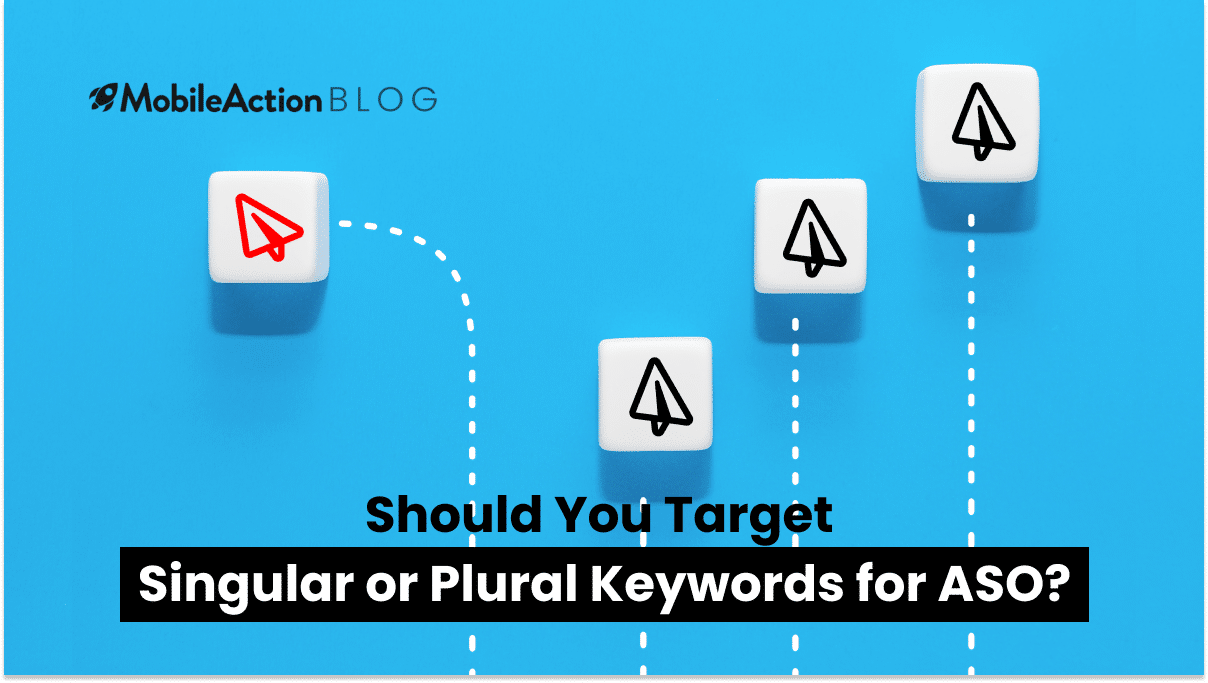If you are thinking about how to promote an app, App Store Optimization is perhaps one of the first things you should do. However, choosing keywords for App Store remains a question. Singular or plural? This is a crucial concept for you to consider when choosing the best set of keywords for app store optimization.
In this blog, we will clarify your target for a successful app marketing strategy by focusing on the choosing keywords for App Store.
You may have assumed that using just singular keywords was covering your bases, e.g. using “kid” has you covered for “kids,” too, and vice versa. After all, Apple recommends avoiding plural keywords when you’ve already used the singular form.
But many app developers and marketers report that their apps rank differently for singular or plural keywords. So which is more important, the singular or the plural form of your keyword?
With limited space, which one should you include?
The answer isn’t always straightforward, so let’s break it down.
Do singular or plural keywords rank differently?
For choosing keywords for App Store, first we must answer, what is the role of plural and singular words for app store visibility?
You can test this out quickly by going to the app store of your choice. Search for “puzzle game” and observe the top results; then type “puzzle games” and do the same thing. The results change, right? You may not notice any of the same results. The same holds true for languages other than English, as well.

Just as with any keyword, notice that ‘puzzle game’ and ‘puzzle games’ have different metrics. For the singular version, there are fewer apps that are organically ranking. Even though the difficulty of ranking for these keywords is somewhat similar, ‘puzzle games’ has a much higher volume, making it the better option in this case.
If you target the singular version of a keyword, it is likely for you to rank for the plural version as well. However, this will not be enough to rank near the top for the plural keywords as you are not targeting it directly.
In the screenshot above, you can see that we used our Keyword Explorer tool to check the live organic rankings for both versions of the keywords. Only one app appears in the top 3 for both the singular and the plural version.
You should also consider user intent when deciding on which form of a keyword to target. If you were looking for a puzzle game (not a specific one) would you search for ‘puzzle game’ or ‘puzzle games’? Most likely the latter one, which also explains the fact that the search volume for ‘puzzle games’ is higher.
Treat singulars and plurals as different keywords
The simplest advice we can give on choosing keywords for App Store, is to treat singulars and plurals as distinct, different keywords.
This doesn’t cover whether or not you should target both forms, or which form to target if you should only pick one, but when you’re considering your app store optimization keyword strategy, start here: consider both singular and plural forms as individually and uniquely as if they didn’t share any of the same letters.
Prioritize the keyword you want to rank higher for
Now that you’re considering singulars and plurals as separate (and not always equal) keywords, let’s look at which ones you should pick for the best mobile app user acquisition strategy.
In a perfect world, you could target the singular and plural forms of each keyword you choose. But realistically, you have limited space. To utilize some of the tried and true ASO recommendations and modify them for your singular or plural keywords choice, such as:
- Determine which keyword has the lower competition, and focus on that one. If they have equally low competition, employ different criteria to choose or focus on both.
- Choose keywords with Volumes of 40 or higher. If one form of your keyword is lower, you can choose to discard it for now.
- Check on your keywords regularly–both singular or plural keywords–and update your app’s title and keywords at least twice a month.
As with all things ASO, try to get in the mind of your ideal user. What word will he or she more likely search for–the singular or the plural? Choose the form of the keyword you want to rank higher on and optimize for that.
Singular vs plural keywords in non-English language localization
Another component to consider for choosing keywords for App Store is that not all plurals are as simple as adding an -s or -es to the end of the word. It makes sense that you’d get different results for “mice” compared to “mouse,” right? When conducting localization, you should also keep in mind that different languages will have different properties when it comes to plural or singular keywords.
Singular or plural keywords: conclusion
App store algorithms don’t treat singular and plural keywords the exact same way; rankings differ for the different forms. So you shouldn’t blindly use only singular or only plural forms of your keywords, nor should you necessarily use both.
How do you choose which form of the keyword to use to best optimize your app? The same way you choose your other keywords.
Research and perform competitive analysis with MobileAction, and incorporate your keyword choices, whether they’re singular or plural or both, into all the relevant places in your app. If you would like to experience the power of mobile app intelligence, schedule a demo with our experts today!






